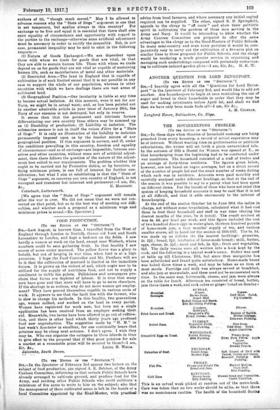FOOD PRODUCTION.
[To viz EDITOR OP THE " SPECTLTOR."] SIR,—Last August, in harvest time, I travelled from the West of England through London to Norfolk. thence via York and South Lancashire to London, and kept a look-out on the fields. I saw hardly a woman at work on the land, except near Wisbech, where numbers could be seen gathering fruit. In that locality I saw scores of acres under mustard. The yellow flower was a glory to behold, but out of keeping in war time, when food is at a high premium. I hope the Food Controller and Mr. Prothero will see to it that the cultivation of mustard is limited in the immediate future. It is grown on the richest of soil, which ought now to be utilized for the supply of nutritious food, and not to supply a condiment to tickle the palate. Politicians and newspapers pro- claim that farms are depleted of labour. It is true that many men have gone and that more will have to go to serve elsewhere. If the shortage is so serious, why do not more women get employ- ment? They have proved themselves capable in various sorts of work. It appears to me that the fault lies with the farmer, who is slow to change his methods. In this locality, two generations ago, women milked, and worked on the land in every parish. Women have registered for work now, but here not a single application has been received from an employer seeking their , aid. Meanwhile, two farms have been allowed to go out of cultiva- tion, and there is other land which thirty pears ago produced food now unproductive. The suggestion made by " H. M." in last week's Spectator is excellent, for one continually hears that potatoes may be cheap next autumn. I don't agree. I wish they may be. Who can organize the cottagers in.theso islands in time to give effect to the proposal "that if they grow potatoee for sale a market at a reasonable price:will be -secured to thern?—I am,


































 Previous page
Previous page